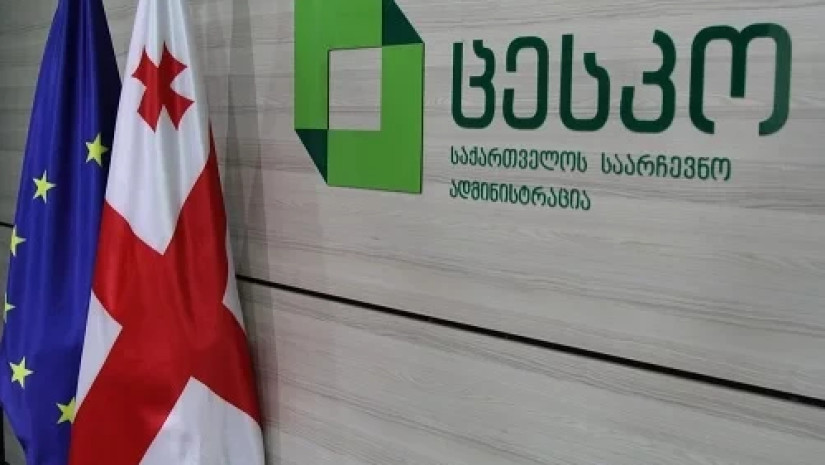According to Giorgi Kalandarishvili, the head of Georgia’s Central Election Commission (CEC), a total of 3,061 polling stations have been opened across the country, with 2,284 using electronic voting and 777 using traditional methods, all of which are ready to receive voters. Kalandarishvili noted that the elections, through which citizens will elect 2,058 members of 64 municipal councils and 64 mayors, will begin at 08:00 and end at 20:00.
“Tomorrow, October 4, regular elections for the municipal representative body (council) and the mayors of self-governing cities/communities will be held. Georgian citizens will elect 2,058 members of 64 councils through both proportional and majoritarian systems, as well as 64 mayors.
The electoral process will be monitored by observers from 28 international and 27 local organizations, and it will be covered by nearly 1,000 representatives from 73 media outlets. Among the registered international organizations are representatives of embassies from various countries, international organizations, and election administrations from 21 countries, including Bulgaria, Albania, Bosnia and Herzegovina, Hungary, Slovakia, Montenegro, Turkey, and Moldova.
It is noteworthy that today, throughout the day, working meetings will be held with election administrations and international organizations from various countries, during which I will personally provide information on any issues related to the elections that are of interest to them.
Furthermore, 12 political parties are registered for the October 4 elections. In Tbilisi, 9 candidates are registered for the mayoral position. All 12 political associations have submitted party lists for the Tbilisi council elections.
In addition to Tbilisi, a total of 112 mayoral candidates are registered in the remaining 63 municipalities, including 4 candidates nominated by initiative groups.
As for majoritarian candidates registered in local majoritarian electoral districts, a total of 2,228 candidates are registered, including 32 nominated by initiative groups. In Tbilisi, there are 160 candidates.
A total of 3,061 polling stations have been opened nationwide, with 2,284 using electronic voting and 777 using traditional methods. Among them are 10 polling stations established for exceptional cases in penitentiary institutions.
All polling stations are ready to receive voters. The voting process will begin at 08:00. Voters must bring a valid Georgian citizen’s ID or passport. Voting concludes at 20:00, but voters in line at that time will be able to cast their votes. To facilitate this, a member of the precinct election commission, on the instruction of the commission chairperson, will register voters in line, allowing them to participate in the voting process.
It should be noted that municipal elections are among the most complex and challenging in terms of administration. Accordingly, the election administration has been actively preparing throughout the year to conduct the elections at a high professional level in accordance with international standards, carrying out numerous large-scale activities in various areas.
Based on the work carried out and the results of mock voting, I can confidently say that the administration is fully prepared for tomorrow. I express my gratitude to all election administrators and all involved parties, from public institutions to various entities (political parties, media, NGOs, etc.), for their contributions and support in the preparation process for these crucial elections.
The Central Election Commission calls on district and precinct election commissions to facilitate the critical process of election observation and coverage while strictly adhering to the rules established by law. It also urges observer organizations to comply with the legislation, refrain from interfering in the functions and activities of the commissions, and thereby contribute to conducting the electoral process in a calm and professional environment. The election administration will operate within the framework of the law and, in cases of interference or obstruction, will promptly apply the mechanisms provided by law.
Elections are a collective endeavor, and therefore, I first call on voters to be active, come to the polls, and exercise their right to vote. I also call on all involved parties—registered political parties, local and international NGOs, and the media—to contribute to conducting the electoral process in a calm and free environment. Your participation is crucial for ensuring the transparency and integrity of the electoral process.
Detailed information about polling stations, activities, and other statistics will be posted on the CEC website and provided to media representatives for dissemination.
The election administration is ready to administer the elections transparently and at a high professional level in accordance with the legislation. I would like to highlight that these are the first municipal elections where the election administration will use electronic technologies on a large scale, significantly increasing the speed and simplicity of procedures and ensuring transparency.
For the October 4 municipal elections, the total number of voters is 3,513,818. Of these, 3,130,348 voters will participate in elections using electronic technologies.
Notably, this year, for the first time, approximately 47,000 young people will have the opportunity to vote, and the CEC has conducted numerous informational activities to inform them.
A total of 60,754 voters have requested mobile ballot boxes.
The elections will be administered by approximately 34,000 election administrators.
At polling stations using electronic voting, voters will receive one ballot divided into three columns. Along with the ballot, the registrar will provide the voter with a special frame-envelope of the appropriate format. At electronic polling stations, voters should not circle the number of their preferred electoral subject but, using a special marker, fill in or mark the circle next to only one preferred electoral subject/candidate in each column and place the ballot into the vote-counting machine under the slot cover using the special frame-envelope. It should be noted that the slot cover is being used for the first time in these elections.
The vote-counting machine automatically counts the votes, and after the voting process is completed and mandatory procedures are carried out, it prints a preliminary results extract, which is sent to the CEC via a tablet. This, of course, means that the time for publishing preliminary results will be significantly reduced, and within 1–2 hours after the voting ends, depending on the receipt and consolidation of information, the public will be informed of the initial preliminary data. Notably, the transmitted data will be available to any interested party on the website results.cec.gov.ge.
To ensure transparency and reliability, manual counting of ballots is also provided for. During the manual counting, commission members sort valid and invalid ballots and compare the results with the machine’s data.
At the remaining polling stations, voting will follow the established procedure, but ballots will be scanned, digitized, uploaded to a secure platform, and made available to all interested parties.
I would like to emphasize that the electronic machines are not connected to the internet, eliminating the risk of cyber interference. Voting is, of course, secret. All polling stations are equipped with modified (so-called cut-out) booths. I remind you that taking photos or videos inside the booth is prohibited. Additionally, there is no link between the voter and the ballot or between the verification machine and the ballot, which is another prerequisite for ensuring secrecy.
It is also important to note that, based on the experience of the election administration and the vendor company, the likelihood of any machine malfunctioning is minimal. However, such cases are accounted for and covered. The key point is that voting will not be interrupted under any circumstances.
Throughout the day, the CEC’s contact hub will operate at 2 51 00 51. Additionally, a media center will function continuously, where media and parties involved in the electoral process can obtain information on topics of interest.
We call on all involved parties to strictly adhere to the legislation and contribute to conducting the elections in a calm environment,” stated Kalandarishvili.


















